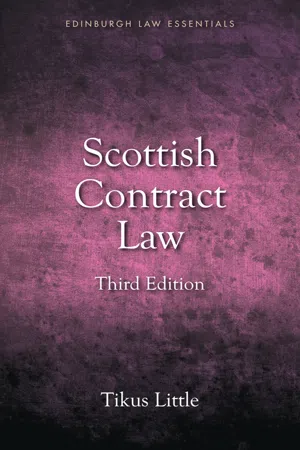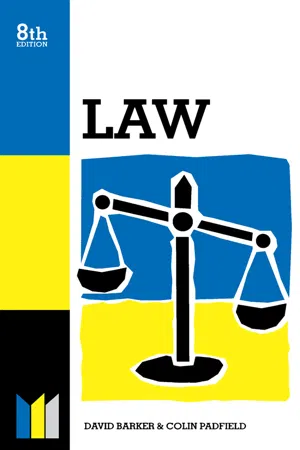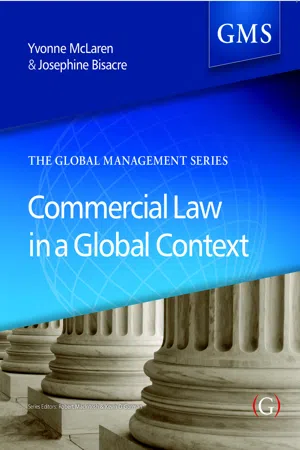Law
Breach of Contract
Breach of contract occurs when one party fails to fulfill their obligations as outlined in a legally binding agreement. This can involve failing to perform, not performing on time, or performing in a manner that does not meet the terms of the contract. When a breach occurs, the non-breaching party may seek legal remedies, such as damages or specific performance.
Written by Perlego with AI-assistance
Related key terms
1 of 5
7 Key excerpts on "Breach of Contract"
- B.S. Patil, S.P. Woolhouse(Authors)
- 2019(Publication Date)
- CRC Press(Publisher)
10Breach of Contract
10.0 IntroductionA breach of a contract is failure to perform an obligation arising out of the contract. Where there is failure to perform an obligation, in whole, it is a total breach. When an agreement is broken only in part it is a partial breach. If a party announces, before his performance is due, his definite unwillingness or inability to fulfil the contract, he thereby admits he is guilty of a breach. The breach in such a case is called an anticipatory breach. Occasionally a party may deliberately incapacitate himself or render impossible the performance of his contract duties; or may so interfere to render performance by the other party impossible. Such tactics also constitute a Breach of Contract.Every breach of a contractual obligation confers upon an injured party a right of action. However, there are a number of valid excuses for non-performance of contractual obligations. An actionable Breach of Contract, therefore, occurs when a promisor, without sufficient excuse or justification, fails to perform in accordance with the dictates of his agreement.Further, there is a distinction between breach of a contract and termination of a contract. When a contract comes to an end it is said to be terminated. Breach of Contract may constitute a means of contract termination. However, there are a number of ways other than a breach by which a contract can be terminated. Full and satisfactory performance by both sides is the usual mode. The other modes include:- Release under seal
- Rescission by consent of parties
- Accord and satisfaction
- Exercise of option given to a party in a contract to terminate under certain circumstances or events
- Rescission by a party on account of repudiation or non-performance by the other party
- Frustration or impossibility of performance
It may be noted that many common forms of breach of important contract conditions are dealt with in their appropriate places in different chapters in this book. The law applicable to some forms of Breach of Contracts not dealt with elsewhere in the book is considered in this chapter.- eBook - PDF
- Tikus Little(Author)
- 2016(Publication Date)
- EUP(Publisher)
6 Breach of Contract Many students of Scots law find Breach of Contract difficult: it is not helped by the fact that the key words used in Breach of Contract are sometimes used in different ways by different judges and academic writers. However, a question on Breach of Contract can usually be broken down into two key questions: • What type of breach is it? • What is the remedy for that breach? This chapter will focus on answering those two key questions but first it is necessary to consider the role of Breach of Contract.What is it for? The first point to note about Breach of Contract is that it is about performance of the contract rather than a problem with the contract itself. Previous chapters have discussed how contracts are formed and the problems which may occur if certain key elements are lacking or the terms of the contract are difficult to interpret or the contract contains clauses which are frowned upon in law. However, Breach of Contract is something else altogether: Breach of Contract is concerned with a failure to perform one’s obligations under the contract or to do so properly or on time. Each of the parties will have certain obligations under the contract and they will usually have agreed when those obligations are to be performed (due date for performance). Examples of behaviour which can amount to Breach of Contract include the following: • Failing to pay the contract price on time. The contract price will be the amount of money due to be paid by one party to the other for the goods, services, rent, etc. when it falls due. The contract will usually specify a time for payment and that is the due date for performance of that obligation. • Failure to deliver goods ordered under the contract. • Failure to deliver the correct goods (for example, a garden centre business which orders 3,000 lavender bushes from its supplier will not be pleased if 3,000 rose bushes are delivered instead) • Failure to deliver the goods at the right time. - eBook - PDF
Construction Planning NQF4 SB
TVET FIRST
- Sparrow Consulting(Author)
- 2013(Publication Date)
- Macmillan(Publisher)
The breaching party is usually forced to pay a penalty to the other party. The contract can only be terminated when a fundamental part of the contract has not been fulfilled. Ignorance is not a valid excuse for not being able to complete the work specified in the contract. Once you have signed the contract you are obliged to do the work, whether you are aware of what you have signed or not. Saying that you did not know that the contract included a specific job is not a valid excuse, and the client will probably force you to complete the work or take legal action against you. Think about it Maxim: A saying or expression of a general truth. Breach: Break the promise made in the contract to do something. Fundamental: Affecting the most important and central parts of something. Words & Terms Assessment activity 1.5 Individual activity Answer the following questions in your own words. 1. Explain the meaning and importance of the maxim caveat subsciptor. 2. Explain how a Breach of Contract could happen if you do not carefully read the contract. Always ensure that you have gone through the contents of a contract before you sign it. The contract may be binding you to obligations that you cannot or do not want to fulfil. Think about it 12 Module 1: Define contract terminology Module summary In this module you learned: • There are a number of important concepts and terms that you will find in a construction contract. These include practical completion, the difference between guarantees and surety, retention money and defects liability period. • It is important that even the smallest project outlines the responsibilities and rights of each party clearly in a written contract. • The essential elements of a valid construction contract are listed. They are: projects to complete, time frames, payment terms and dates, delays and changes, work methods and quality. - eBook - PDF
Law
Made Simple
- D. L. A. Barker, C. F. Padfield(Authors)
- 2014(Publication Date)
- Made Simple(Publisher)
7 THE LAW OF CONTRACT In his book Principles of the Law of Contracts, Sir William Anson defined a contract as a legally binding agreement made between two or more parties, by which rights are acquired by one or more to acts or forebearances on the part of the other or others. Shortly it may be defined as an agreement between two or more parties which is intended to have legal consequences. The agreement referred to in the definition means a meeting of minds, called in law consensus ad idem, signifying that the parties are agreed together about the same thing. The definition also emphasizes that the parties to the contract must intend that their agreement shall be legally enforceable. Unless the law regognizes this and enforces the agreements of parties, it would be impossible to carry on commercial or business life. For this reason the law of contract plays a leading role in courses on business studies. These contractual agreements give rise to rights and obligations which the law recognizes and enforces. But certain agreements, such as domestic and social arrangements, are not intended by the parties to be legally binding. The law allows for this. Thus, if Cumming and Gowing agree to meet for dinner and Gowing fails to turn up, the law will do nothing in the matter. The agreement was not intended to create legal rights and duties, and, as such, it is not a contract in law. Every contract is an agreement, but not every agreement is a contract. The object of the law of contract is to identify those agreements which it will enforce and those which it will not. This is of prime importance and will be referred to later in more detail. 1. Essentials of a Valid Contract An agreement will be enforced when the following essential elements exist: (a) Offer and Acceptance. There must be an offer by one party and an acceptance of it by the other. (b) Intention to create legal relations. (c) Capacity of the parties. Each party must have the legal capacity to make the contract. - eBook - PDF
- Yvonne McLaren, Josephine Bisacre, Yvonne McLaren, Josephine Bisacre(Authors)
- 2016(Publication Date)
- Goodfellow Publishers(Publisher)
115 7 Extinction of Contractual Obligations and Breach of Contract Material and non-material breaches Some breaches of contract are more serious than others. If there is no perfor -mance at all, or the performance differs markedly from that contracted for, that would be material breach. As shown in Chapter 6, sometimes people expressly state in the contract which provisions will be regarded as material. More trivial breaches of contract are non-material. Where there has been material breach, the party in breach is said to have repudiated the contract. If a court considers there has been material Breach of Contract, more remedies are available than for non-material breach. If a contract has been repudiated by the material breach of one of the parties, the other party can rescind the contract. This results in freeing the party who rescinds the contract from further obligations under the contract. However, the decision in Wade v Waldon 1909 S.C. 571 points to the what happens if the ‘innocent party’ wrongly second-guesses what a court might do and rescinds a con -tract in which the court later determines that the breach was non-material. Wade v Waldon 1909 S.C. 571 Facts of the case: A comedian contracted to appear in two Glasgow theatres for a week. His contract obliged him to supply advance publicity material. When he failed to do that, the man-agement of the theatres cancelled his show, on the grounds of the comedian’s mate-rial Breach of Contract. He then offered to do the show, but this was not accepted by the theatre management. Consequently, the comedian sued the theatre company for damages for its Breach of Contract. Court decision: The failure to deliver the publicity material was held not to be material breach, and therefore rescission of the contract was not justified. Consequently, the failure to allow the comedian to perform was itself repudiation, justifying a claim of damages by the comedian. - Lisa M. Fairfax, Paul Schiff Berman(Authors)
- 2018(Publication Date)
- Research & Education Association(Publisher)
When a breach is trivial, a promisee can bring suit to recover damages related to the breach, but is not entitled to suspend her performance. Thus, suppose A contracts with B to pay B $5,000 to sing at A’s party which is planned from 8 p.m. to 2 a.m. Under the contact, B also agrees to arrive at the party at 7:30 p.m. in order to set up and rehearse. If B arrives at 7:40 p.m., he has committed a breach because he has failed to render performance in accordance with the contract terms. However, because arriving ten minutes late should not impair the value of the contract, the breach would be considered trivial. As a result, while A could bring suit against B for damages associated with B’s late arrival, A could not refuse to satisfy her obligation of paying B $5,000.Material BreachA breach is considered material when it is so central to the contract that it significantly impairs the contract’s value to the promisee. If a breach is material, there has not been substantial performance. In addition to her ability to bring suit to recover damages, a material breach allows the promisee to suspend her performance and wait for the promisor to cure the breach. However, she cannot terminate the contract. Because a material breach does not terminate the contract, the promisee cannot seek alternative arrangements for the contract. In the above singing example, a material breach would occur if B does not arrive until 10 p.m. because B’s ability to perform from 8 p.m. to 2 a.m. is a central part of the contract. However, if the breach is only material, then A could not hire another singer to replace B because such an action would be construed as a termination of the contract.Total BreachCourts look at a variety of factors to determine if a breach is total . Such factors include whether (a) there is a likelihood of cure, (b) further delay will prevent the promisee from making alternative arrangements, or (c) prompt performance is a critical element of the contract. All total breaches are material breaches.A total breach discharges the promisee’s obligation, allowing her to withhold performance, terminate the contract and bring suit to recover damages related to the full value of the contract. If a breach is total, a promisee is allowed to seek alternative arrangements for the fulfillment of her contract. In the above singing example, if B has not arrived at the party by midnight, B’s breach is likely both material and total because it would be difficult for B to cure the breach and it is unlikely that she will be able to find another singer for her party if she does not act quickly once B fails to arrive as scheduled. Unlike a material breach, once a breach is total, A is allowed to seek alternative arrangements such as hiring another singer.- eBook - ePub
- Richard Stone(Author)
- 2014(Publication Date)
- Taylor & Francis(Publisher)
10Performance and Breach
INTRODUCTION
The topics of performance and breach have links with two other areas. First, the issue of whether a particular term is a ‘condition’ or a ‘warranty’ ties in with discussion of the contents of the contract (dealt with in Chapter 4 ). Indeed, contract texts will often deal with the issue at that point. Second, the question of what the consequences are of breaking a contract, and in particular whether there is a right to treat the contract as repudiated, has obvious connections with the whole topic of remedies (which is covered in Chapter 11 ). Questions may well, therefore, overlap with these other two areas.The main issues dealt with in this chapter are:the distinction between conditions, warranties and innominate terms – how the courts decide into which category to put a particular term, and why this is important; andthe distinction between ‘entire’ and ‘severable’ contracts or obligations, as in, for example, Cutter v Powell (1795) , and the doctrine of ‘substantial performance’, as in Hoenig v Isaacs (1952) .The first of these issues is a complex one, requiring you to deal with questions of the parties’ intentions, and how these should be assessed, as well as looking at the requirements of the commercial world. The case law is not straightforward, with different courts apparently taking differing approaches. You need to understand where the difficulties lie, but you cannot hope to explain them all satisfactorily in the space available.The topic of what amounts to performance of a contract is probably easier, in that the case law is less complicated. There is some uncertainty as to what precisely is the difference between incomplete performance and complete but defective performance, but this is an issue that turns as much on the facts of the situation as on any clear principles of law.
Index pages curate the most relevant extracts from our library of academic textbooks. They’ve been created using an in-house natural language model (NLM), each adding context and meaning to key research topics.






